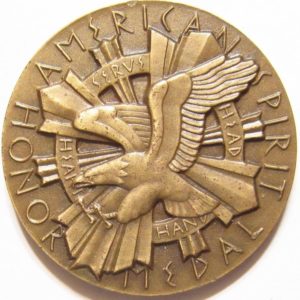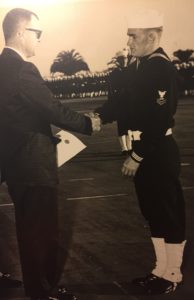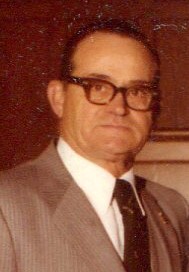I won what the Navy called the “American Spirit Honor Metal” as the top recruit in my 800-man boot camp battalion.
 I think the chief who ran Company 526 picked me to represent the company mainly because I had the highest average score on the weekly tests we were given. That’s not saying much. In those days a good many Navy recruits were high school drop outs.
I think the chief who ran Company 526 picked me to represent the company mainly because I had the highest average score on the weekly tests we were given. That’s not saying much. In those days a good many Navy recruits were high school drop outs.
The 10 of us, one from each 80-man company in the battalion, were questioned, one by one, by an officer who cut the list of candidates to three. The questions he asked were easy. One, I remember, because of his reaction to my answer.
“What is your first obligation if you are captured?” he asked.
“To escape,” I answered.
He looked at me with a hard face and asked, “Have you been given the answers to these questions?”
“No sir,” I answered. “There are posters outside all of our classrooms. One of the posters said if we are captured our first obligation is to escape. I read them while we wait for class to start.”

The three candidates who survived the first cut were interviewed by a three-member panel of officers and I won. The next day the chief who ran my company asked, “What did you tell them, Stith?”
“What do you mean?” I said. “I answered their questions.”
“They didn’t want to pick you. They said you are a racist.”
* * *
The three-officer panel had asked me a lot of military questions which I easily answered. I don’t think I missed any. And then they asked me how I felt about racial segregation.
They had my military record. They knew I was a Southerner, born in Alabama, raised in Alabama and North Carolina in the 1940’s and 50’s. For the first time, I paused, torn between the truth and what I knew they wanted to hear.
“Take your time,” one of the officers said.
Then I thought, What the hell. I told them. I said I had no problem taking orders from a Negro enlisted man or officer, or serving side by side aboard ship. But I did not believe in what I called “social mixing.”
In an odd sort of way I am grateful for that day. A lot of other people don’t remember what they were 58 years ago, exactly where they stood, and, consequentially, can’t know how much they’ve changed.
NOTE: My battalion and another battalion graduated on the same day. The top recruit from the other battalion was a black man.
Coming Friday: Let’s Try Again
